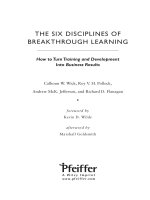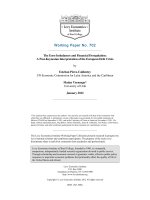Locke spender confronting managerialism; how the business elite and their schools threw our lives out of balance (2011)
Bạn đang xem bản rút gọn của tài liệu. Xem và tải ngay bản đầy đủ của tài liệu tại đây (3.53 MB, 240 trang )
Zed Books is an independent progressive publisher with a
reputation for cutting-edge international publishing. Innovative
and thought-provoking, the Economic Controversies series
strips back the often impenetrable façade of economic jargon
to present bold new ways of looking at pressing issues, while
explaining the hidden mechanics behind them. Concise and
accessible, the books bring a fresh, unorthodox approach to a
variety of controversial subjects.
Series editor Edward Fullbrook is the founder and editor of
the Real World Economics Review (formerly the Post-Autistic
Economics Review), which has over 11,500 subscribers. He has
edited a number of books on economics, including Pluralist
Economics (2008) and A Guide to What’s Wrong with Economics
(2004), and his essays on economics and philosophy have
appeared in numerous anthologies and journals.
Already published in the Economic Controversies series:
Yanis Varoufakis, The Global Minotaur: America, the True
Origins of the Financial Crisis and the Future of the World
Economy
About the authors
Robert R. Locke is Emeritus Professor at the University of
Hawaii at Manoa. He is one of the leading international authorities on the contentious subject of management, and the author
of numerous books and articles on comparative management
and management education.
J.-C. Spender is Visiting Professor at Lund University’s School
of Economics and Management and at ESADE (Universitat
Ramon Llull). Now retired after seven years as a business school
dean, he works as a consultant, researcher, writer, lecturer, and
generally itinerant academic.
Confronting Managerialism
How the Business Elite and Their
Schools Threw Our Lives Out of
Balance
Robert R. Locke and J.-C. Spender
Z
Zed Books
London & New York
Confronting Managerialism: How the Business Elite and Their Schools
Threw Our Lives Out of Balance was first published in 2011
by Zed Books Ltd, 7 Cynthia Street, London N1 9JF, UK and
Room 400, 175 Fifth Avenue, New York, NY 10010, USA
www.zedbooks.co.uk
Copyright © Robert R. Locke and J.-C. Spender 2011
The rights of Robert R. Locke and J.-C. Spender to be identified as the
authors of this work have been asserted by them in accordance with the
Copyright, Designs and Patents Act, 1988
Typeset in Bulmer MT
by Bookcraft Ltd, Stroud, Gloucestershire
Index by Rohan Bolton,
Cover designed by www.alice-marwick.co.uk
Distributed in the USA exclusively by Palgrave Macmillan, a division of
St Martin’s Press, LLC, 175 Fifth Avenue, New York, NY 10010, USA
All rights reserved. No part of this publication may be reproduced, stored
in a retrieval system or transmitted in any form or by any means, electronic,
mechanical, photocopying or otherwise, without the prior permission of
Zed Books Ltd.
A catalogue record for this book is available from the British Library
Library of Congress Cataloging in Publication Data available
ISBN 978 1 78032 073 1 eb
To the many victims of managerialism
“The owl of Minerva takes flight at dusk.”
– G. F. W. Hegel
Contents
list of tables and figure
acknowledgments
preface
1
2
Introduction: Managerialism and business school
education 1920–1970
viii
ix
x
1
The failure of management science and the US
business school model
22
US managerialism and business schools fail to find
their moral compass
61
3 Managerialism and the decline of the US automobile
industry
106
4 Managerialism, business schools, and our financial
crisis
133
Conclusion: Back to balance
174
references
index
193
208
Tables and figure
Tables
1.1 Membership in operations research societies in
Europe and the USA
2.1 Christianity in the USA
3.1 Units of production – Japanese automobile firms,
2005–2006
3.2 Japanese auto parts manufacturers in North America
3.3 Production behavioral values – Big Three and the
Toyota Production System
3.4 Comparative performance of major automobile firms,
2006
4.1 German firms on the 2007 Fortune World 500 list
4.2 Japanese firms on the 2007 Fortune World 500 list
29
86
109
110
116
118
146
147
Figure
3.1 Big Three mass production process – post World
War Two
111
Acknowledgments
We would like to thank Edward Fullbrook, general editor of the
Zed Books series Economic Controversies, for rousing us from
our dogmatic slumbers with a request to write this short book on
managerialism and business schools. We acknowledge, too, our
debt to the following colleagues for their splendid help in the
preparation of the text and the manuscript: Kenneth A. Locke,
Chair of the Department of Religious Studies, University of the
West, for material about Christianity; David A. Carter, Associate
Professor of Finance, Oklahoma State University, Stillwater, for
information on finance; and Vanessa Karam, of University of the
West, and Idus A. Newby, of Cochran, Georgia, for their prompt
and skillful editing of the manuscript. The final result, of course,
is solely our responsibility.
RRL
JCS
Preface
As historians, we are keenly aware that our focus is on the
thoughts and actions of the three generations who lived through
the period covered in this study – from the Great Depression of
the 1930s to the present. But we also know that “dumb” facts do
not speak for themselves, and that to give them a voice we need
a narrative line. Ours can be identified from the components of
our title, and it is simple. Today the people of the USA, indeed
the world, live in difficult times, and to a significant extent
American managerialism and US business schools have exacerbated these difficulties. Their ideas and actions shape the US
and world economies and thus many lives.
Notice our title deals with managerialism, not management.
Management is a big topic that cannot be properly treated here.
Our focus is narrower, on managerialism. Although by the
middle of the twentieth century the American idea of management had been more or less subsumed by managerialism,
management and managerialism are not coextensive. While
management can be defined as getting things done in organizations through people, managerialism means that in businesses,
managers have come to view themselves as a professional caste.
preface
xi
The distinction between managing and managerialism allows
us to criticize managerialism without denigrating the critically
important function of management.
Managerialism is defined as follows:
What occurs when a special group, called management, ensconces
itself systemically in an organization and deprives owners and
employees of their decision-making power (including the distribution of emoluments) – and justifies that takeover on the grounds
of the managing group’s education and exclusive possession of
the codified bodies of knowledge and know-how necessary to the
efficient running of the organization. (Locke, 2009, 28)
The managerialist caste arose in the mid-twentieth century
as the post–World War Two economy boomed. Its public face
was the reputation for commercial brilliance the boom implied.
Yet the connection is far from obvious; many other causes can
be cited. So, far from presuming the changes in management
technique and attitude were beneficial, our book examines
the damaging impacts this caste and its practices had in other
ways, for instance, on people’s ability to make sense of their
existence in a globalized society and economy as the twentieth
century drew to a close. Without wishing to evoke a previous
“golden age,” our narrative line moves from managing in a
place where life was relatively in balance to one in which, in
part because of the effect of managerialism, life spun progressively out of balance. The expression is taken from the Hopi
word Koyaanisquatsi, which means “crazy life, life in turmoil,
life out of balance, life disintegrating, a state of life that calls for
another way of living.” Or, for those with religious inclinations,
an existence without God’s grace; or, for humanists, one devoid
of humanity in people’s daily lives.
With the history of managerialism as one theme, our book’s
companion topic is business school education. Managers get
xii
confronting managerialism
their education in a variety of ways today, usually on the job.
Increasingly, however, the selection and training of managers
has become the focus of business-school-based education.
Thus we critique the US elite business schools whose growth in
the twentieth century has been associated with the rise of managerialism (Locke 1984, 1989, 1996, 2000, 2009; Spender 2005,
2007, 2008a, 2008b, 2008c). The elite schools’ influence over
the lesser-ranked schools around the world is huge, especially
when it comes to the content of their programs and the ethos
their programs inculcate. The management education industry
is now vast and global, but almost all of it marches to these elite
schools’ drummers. Harvard Business School, which opened
in 1908, has just celebrated its centennial while the Wharton
School, arguably the first modern US business school, dates
to 1881 (Engwall and Zamagni, 1998; Sass, 1982). Many other
business schools – Chicago, Dartmouth, Columbia, University
of Texas, etc. – trace their origins to the first quarter of the twentieth century. However, business school growth really exploded
after World War Two with the proliferation of Master of Business
Administration (MBA) programs driven, in part, by the GI Bill’s
support for the broad expansion of higher education and in part
by the needs of a dynamic economy. The schools’ growth has
continued, even as the US economy has faltered from time to
time. Business studies now preoccupy one of every five US
college students. Eventually US business education, along with
US systems of corporate governance and finance, became major
export items.
While concerned with the form and content of business school
education, our book is not a further addition to the expanding
literature charging business schools with failing to deliver against
their original promise (Khurana, 2007). We are preoccupied,
rather, with how that promise never meshed well with the US’s –
and the wider world’s – management needs, and instead helped
progressively to spin our lives out of balance. Management is a
preface
xiii
practice; hence, business studies, like other practitioner disciplines, must stand on intimate acquaintance with the context
of the practice it purports to teach. The subtleties of the interactions between theorists and experimenters in the natural
sciences show that this intimacy does not necessarily mean that
business theorists have to engage in business themselves. But
they do need to remain attached to the world of business practice and resist the temptation – one that goes back to the ancient
interplay of Platonic and Aristotelian approaches to the world
– to invent an abstract world that they find more attractive, for
reasons that are largely methodological, than the real one. Those
who take up intellectual residence in such an invented abstract
world precipitate multiple failures: in the business community,
among students looking to enter that community, and by encouraging the moral failure of the community itself.
Our intent is to show how the methodologies introduced
into business school education combined with managerialism
to foster today’s world out of balance. To expose this, our book
explores two themes. First, how the balance was disturbed
by the obsessive preoccupation with numbers that followed
the development of the “new paradigm” in business school
curricula after World War Two (Locke, 1989). For people in that
immediate postwar generation, numbers implied objectivity
and accuracy. They were led to think, erroneously, that decisions based on numbers would be independent of the observer
or of mere opinion. They also thought management could
decide rationally and aspire to omniscience. But for most practicing managers not all the variables that affect their decisions
and outcomes can be modeled mathematically. At the point
where outcomes cannot be modeled, where numbers no longer
suffice and the managers’ rationality is evidently bounded, there
human agency or judgment enters in to counterbalance the
messages the numbers convey.
xiv
confronting managerialism
The Enlightenment philosopher John Locke called the point
where people could not rely on a numbers-driven logical conclusion the moment of subjective judgment; others speak of the use
of imagination, meaning that point in the analysis and evaluation
where the agent’s mind, for lack of a determining relationship
between cause and effect, intervenes to supply her/his “subjective” solution. Those obsessed with the primacy of numbers
find it difficult to accept the proposition that nonquantifiable
variables have to be considered. How many times have we heard
repeated Lord Kelvin’s quip “if you cannot measure it, you
cannot improve it”? René Descartes so disliked nonquantifiable
variables that he excluded them as illusionary, as did the postwar
business school curriculum reformers in the Ford Foundation
program (Khurana, 2007, 233–88). Winston S. Churchill, who
fully appreciated the importance numbers have for policy
makers, differed; he grasped the deep significance of “soft” variables when managing events in the sphere of human action and
interaction. Which is why he, as one of the twentieth century’s
great rhetoricians, devoted around forty minutes of thought,
preparation and rehearsal to every minute of his speeches, and
why those speeches were so memorable and world shaping.
Men of great historical importance from Pericles to Abraham
Lincoln to Charles de Gaulle have always appreciated the power
of rhetoric to reach beyond “numbers alone” to bring forth and
shape the agency of others. Rhetoric, as a practice of analyzing
and inducing social action, goes back at least to Isocrates (436–
338 BC) who felt that the distinctive aspect of Man is that he
can “both persuade and be persuaded.” Since in this book we
argue that much of management is about numbers failing, we
also argue it is more about persuasion and the shaping of others’
agency than business education currently admits – and is correspondingly less about the numbers that are so clearly considered
determining by so many influential business educators.
preface
xv
The point is that human agency counterbalances the seeming
objectivity of numbers or rather comes into play where numbers
leave off or fail. Quantification is generally important but seldom
all-important, and sometimes it is not important at all. This
also means that agents/managers must understand the limits
to their agency, know where and when the numbers are determining, as well as when they are not. The French general staff,
for instance, made this miscalculation in 1914. They imbibed
Colonel Grandmaison’s doctrine that the general who loses the
battle is “the one whose will cracks first.” Engaging the German
army’s superior firepower made this doctrine disastrous; their
guns mowed French troops down – even while generals who
refused to consider stopping the carnage for fear of being seen
to “crack” urged them on. The irony is that the real value of
training in the use of numbers springs not from denying the
relevance of management’s judgment, but from those managers
who, being responsible anyway, fully appreciate the limitations
of numbers. Those who do not know them and use numbers
blindly make huge mistakes – as we might have learned from
linking wartime strategic decisions to “body counts.”
Unlike mathematical modeling, which rests on ostensibly
universal principles, the agency analytical synthesis is always
specific to a unique situation, never generalized or stored
as manager-independent heuristics or Standard Operating
Procedures. Agency is also profoundly morally burdened since
it is not just an idea. It leads on to actions that affect others and
the world. Many business entrepreneurs understood this in the
past because a different culture prevailed. Business literature
of the nineteenth century, even after the advent of the “robber
barons,” often refers to the businessman’s “social duty” and the
need to seek a moral balance between social and private benefit.
But today, along with fetishing quantification in the business
school curricula, students are trained to forget “soft” issues in
xvi
confronting managerialism
the most self-destructive ideological switch that could be imagined: a switch to an ideology that has little to do with politics
or religion but bears directly on how we think about management. Real business, as opposed to the models imagined and
propagated by, say, University of Chicago economists, is about
everything except what can be measured. Ultimately the value of
measuring and modeling lies in how it helps the entrepreneurial
manager focus her/his imagination on what remains: the area of
uncertainty or “knowledge absence” into which entrepreneurial
agency must be projected.
All significant, efficacious educational reform ultimately has
significant effects on national leadership. All great reformers
want their nation’s elite schools to awaken a sense of national
responsibility in their students. Napoleon radically reformed the
École Polytechnique to enable it to train a knowledgeable and
responsible elite to run his army and empire. In 1946, Charles
de Gaulle set up the École Nationale d’Administration (ENA)
because he believed the leadership cadres had signally failed
the nation under the Third Republic. West Point, founded in
1802 and modeled on France’s École Polytechnique, cultivated
a culture of military and civil service; it was also the incubator of
the engineer-managers who carried through many of the great
civil engineering projects that served the US national interest so
well during the nineteenth century.
Many people understood, moreover, that a culture of service
could not be cultivated successfully in a West Point, or an École
Polytechnique, or a business school merely through lectures
on ethics and morality or by mindless repetition of slogans like
“honor, service, and country.” Knowledge about leadership is
wrought at the operational business coalface or the platoon level
in the military. Officer training begins with the development
of interaction and trust between officer aspirants and fellow
soldiers. The goal is to develop the realization that even if you do
preface
xvii
not like these guys, they are the people without whose complete
confidence and unconditional full support you will certainly
fail and may die. People learning this in the everyday life of the
unit also learn something fundamental about themselves and
their limitations. They realize that people who know nothing
of their limitations do not know anything useful. The experience of being a member of something beyond the self, a certain
result of being together under fire, creates a special relationship
with those who shared the experience that has no match in any
other sphere of life. Business leadership requires similar selfknowledge, though its circumstances are very different. Tough
projects, undertaken against considerable odds and under high
pressure, lead people to surprise themselves about who they
are, what they can do, and how much they depend on others
with complementary attitudes and capabilities.
Fully committed interpersonal association cannot be learned
by an isolated student in an elite institution; it is always realized
in an operational collaborative context – sociological, political,
technological, geographical, historical, and so on. The military
theorist Carl von Clausewitz believed military education could
and should deliver this kind of knowledge, and it was implemented well in the integrated training regimes of the German
officer corps between the world wars (Lewis, 1985). In contrast,
the American army’s policy of slotting individuals into vacant
skill positions as if they were replacement parts had negative
effects on unit cohesion and combat effectiveness. In this book
the process of workplace association is discussed in depth
because of its contribution to good management in German and
Japanese manufacturing organizational cultures. In contrast,
US managerialism and business school education interrupted
the natural processes of association and collaboration under
pressure, thereby contributing to the poorer performance of
American business after the 1970s.
xviii
confronting managerialism
In earlier years US business school educators engaged the
moral dimensions of managing in their technological and social
educational programs. But post-World War Two reforms in the
structure and content of business schools refocused student
attention more narrowly and almost exclusively on the numbers,
in fact, effectively banishing both soft variables and ethics from
the professors’ purview. Just as significant – and there is irony
here – was the determination of Hayek and his generation of
neoliberal economists to fight fascism by denying the theoretical
possibility of fully rational centralized government. By appealing
to market forces and individualism instead, these economists set
themselves adrift from the very concept of community. In doing
so, they pushed the “market ideology” that invaded business
schools just at the time when the gap between rich and poor in
the US began to increase at an accelerating pace. They brushed
aside the idea that government and business leadership had
complementary rather than competitive roles to play in a society
in which markets function successfully.
This was a moment of profound failure of academic leadership, for the objective market forces to which these neoliberal
economists appealed were not of this world. No one leading
a school of general medicine will stop students from learning
the practice of surgery simply because cutting the human body
cannot be reduced to rigorous theory. Practical education
calls for a fruitful balance of theoretical instruction and carefully guided practical experience, just as German engineering
studies successfully developed and implemented Technik – the
blending of scientific theory with workshop knowhow that is the
traditional German definition of useful engineering. That US
business schools failed – in part through greed, in part through
the genuine difficulty of it – to develop a satisfactory way to
balance abstract theorizing with a practical sense of community
service and engagement is a sign of this leadership collapse. The
preface
xix
US business schools have generally ignored the many years of
experimentation in practical and professional education – in
Germany, the UK, and elsewhere – even as the latter offer good
evidence of the benefits of educational balance for the former
to study and, perhaps, emulate. We live with the consequences.
At the same time managerialism has led to further leadership
failures. As so often in a democracy, people get what they ask
for. Business recruiters have been content to let Yale, Harvard,
Stanford, and the other business schools select students for
them, reducing the business schools’ role to one of facilitating
the ambitious student’s self-selection and caste membership
preparation, while diminishing and maybe abandoning their
educational role. In particular, business schools have been able
to get away with not doing precisely what West Point and the
École Polytechnique were expected to do – cultivate a culture
of professional and public service. Rather, they have become
penetrated by business leaders’ greed, which trickles down as
the students’ evident sense of entitlement, limitless hubris, and
general disregard for social norms that might stand in the way
of their personal success. The business schools’ renunciation of
their moral and political responsibilities to society as they train
those entering the management caste, and that caste’s disinclination to have the business schools assume those responsibilities,
have contributed directly to sending our lives out of balance in
these difficult times.
introduction
Managerialism and business school
education, 1920–1970
Management is an integral part of the post-Enlightenment
democratic capitalism that spins around individualism
and inter-individual relations, particularly those relations
fundamental to economic activity. In the eighteenth-century
Enlightenment, people began to see human progress and
economic activity as related – perhaps ideally identical if we
could ever get the dimensions and metrics right and see the
world’s uncertainty as the source of, or rather the source of
the possibility of, human-induced growth. Growth and innovation can never be “determined” for that implies a closed
system. Rather, growth is a consequence of our human
ability to pull something from the realm of the unknown into
the present.
Some possibilities are not present in Nature but are aspects
of “things” we create, which reminds us of Giambattista Vico’s
notion that the “social sciences” may not be sciences at all in
the sense we mean when we say “natural science” (Vico, 2000).
Nature makes the things natural science theorizes. Human
beings make the things social sciences theorize. The unknown
2
confronting managerialism
from which socio-economic “things” – especially economic
growth – are pulled is not one that Nature has created but the
locus of human imagination, energy and action. While one can
imagine all growth being the result of a specific individual’s
activity, a James Watt or a Henry Ford, society as we know it is
“man-made,” the consequence of collaboration that produces
what we see as growth, the result of harnessing others’ capabilities to managers’ purposes. Collaboration is a hallmark of
human activity, so “managing” it is a fundamental human capability without which we would have no society. Management
today presupposes the agentic capacity and energy of free
people. This has always been at the core of democratic capitalism, the source of its still, at times, astonishing vitality –
right up to the present in places like Silicon Valley (Locke and
Schöne, 2004, 16–50).
Managerialism differs; it is a phenomenon associated
with membership in a specific group of managers that share
specific attributes – a caste. It does not reflect the culture of
democratic capitalism with its commitment to collaboration;
rather the caste desires to stand apart from society, to become
less social and more predatory; to see both markets and
businesses as opportunities to plunder, whatever the consequences; to take unforgiving advantage of the errors, misfortunes, and circumstances of others, no matter how they arose.
Managerialism has done America great harm. No aspect of
that harm is more pernicious than the role business schools
have played in reinforcing the caste’s sense of itself and the
legitimacy of its predatory instincts done in the name of good
management.
Managerialism first appeared during the transformation of
American organizational culture in the late nineteenth century,
partially from changes in workshop routine. Explaining this
change, one observer noted that around 1900:
introduction
3
The skill and knowledge of Europeans … was the equal and
sometimes the superior of that of Americans. The difference
was in how this technical knowledge and skill was used. The
European manufacturer used it to make a product. The American
manufacturer used it to make a process for making a product. A
high-class machinist in Europe [made] the product his company
produced, his American counterpart … set up a semiautomatic
machine for less skilled labor to operate and to make this product,
or he … engaged in making the semiautomatic machine … to
make a product. The literature of the time frequently mentioned
that American machines and tools were superior to the European.
This, however, reflect(ed) not a difference in abilities as much as
a difference in the thinking of European and American management. One appreciated the importance of and understood how to
obtain the advantage from machinery, the other did not. (Litterer,
1961, 467)
To seize the advantage a new class of shopfloor managers
came into existence between the worker and the owner in enterprise; these shopfloor managers developed a cluster of general
factory management skills eventually codified as “scientific
management,” which appeared in the US soon after the turn
of the twentieth century. Frederick Winslow Taylor, the most
prominent person in the movement, described many of the
techniques in important papers on Shop Management (1903)
and The Principles of Scientific Management (1911). These
techniques included time-and-motion studies that managers
conducted to teach workers job efficiency, which meant among
other things that managers not workers controlled skill acquisition and deployment. Taylor and other members of the
scientific management community also developed a myriad of
management accounting techniques (standard costing, marginal
costing, budgeting, etc.) that firms implemented in the new
costing departments established by managers in the pursuit of
efficiency.
4
confronting managerialism
A second transformation led to new administrative structures,
necessary to run the burgeoning corporations then changing
the industrial and business landscape of the USA (Chandler
and Redlich, 1961; John, 1997). Chandler and Redlich have
observed the administrative problems associated with huge
multifunctional firms that had fomented a managerial revolution in their administration by the early 1900s. With thousands
of administrators and tens of thousands of employees, these
firms threatened to become ungovernable as top managers
became more and more distanced from workers and everyday
operations. The resultant change separated managers involved
in strategic decision-making from managers preoccupied with
daily operations. Chandler and Redlich wrote
The centralized coordination, evaluation, and planning for the
diverse activities of a large number of sub-units which often
carried out several different functions of production, distribution, and transportation within a single, purely private enterprise,
was something new in economic history. Such needs brought
the managerial enterprise into being. The new enterprise could
not run efficiently without formal internal organizations. They
required the generation of internal operating, financial and cost
data. Only through a flow of internal impersonal statistics could
control of these large enterprises be maintained. (Chandler and
Redlich, 1961, 5)
In these new multidivisional (or M-form) corporations, the
higher- and lower-level staffs, organized on functional bases,
utilized standard cost and budgetary methods to run an increasingly complicated enterprise. The American managerial revolution, then, consisted of two interrelated aspects: it created (1)
the organizational structure of the modern corporation and (2)
the managerial instruments the organization used.
The resultant division of labor between top corporate
management and sub-units also changed management goals.









